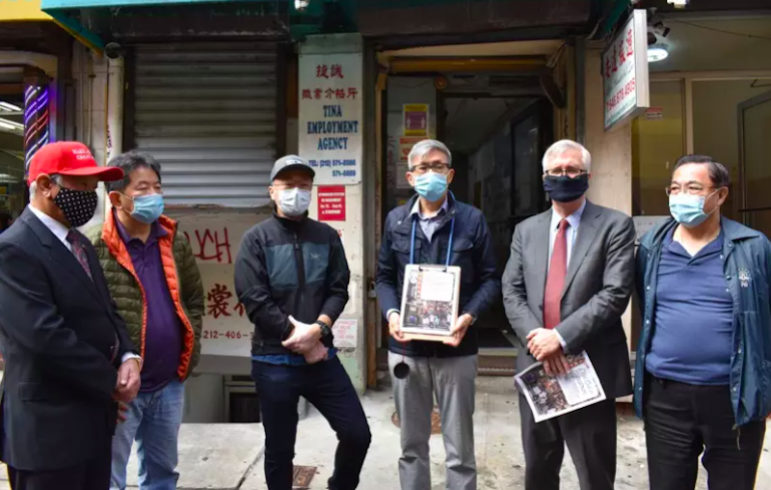The City Council allowed the charge to help struggling businesses cover costs. But owners fear steeper charges might drive away customers.

Jiaying Yan
The Chinatown Business Improvement District held a press conference on Oct. 21 about a survey that showed that as many as 99 percent of the 300 restaurants in the area are unwilling to charge customers “outbreak recovery fees.”This story first appeared in World Journal
Translated by Rong Xiaoqing from Chinese
The City Council passed legislation last month allowing restaurants to charge dine-in customers a “COVID-19 recovery charge” of up to 10 percent of the bill to help cover the costs of rents, utility and wages during the pandemic.
But a survey released by the Chinatown Business Improvement District on Oct. 21 shows that 99 percent of Chinatown restaurants have opted out of the surcharge. By doing so, they hope to attract more customers who pinch pennies during the pandemic to dine in Chinatown.
Wellington Chen, executive director of the Chinatown BID, said the BID surveyed 300 Chinatown restaurants on Oct.15, and only one said it would consider adding the surcharge—and only when it’s on the verge of shutdown. All the others said clearly that they won’t add the surcharge.
Chen said the recovery charge may be an effective way to help restaurants survive in the pandemic. But restaurants in Chinatown worry it would drive away customers. With few tourists and office buildings nearby still empty, what Chinatown needs most is customer flow. When people come to dine in Chinatown, they help boost all businesses in the neighborhood, from retailers to beauty salons, Chen says.
Zhiwei Wu, manager of Bo Ky restaurant on Baxter Street, said the eatery has just reopened and is already facing great challenges. But he believes opting out of the surcharge can encourage more people to come to Chinatown and revitalize the economy here. In addition, Wu said the restaurant’s customers are mainly friends and neighbors now, and he doesn’t want to charge more to them.
State Senator Brian Kavanagh, whose district includes Chinatown, said all restaurants are struggling now, and restaurants in Chinatown are facing greater challenges. Their opting out of the surcharge shows their kindness to the community as well as their resolve to bring people back, he said.
Kavanagh said elected officials are now trying to push for the passage of the COVID-19 Small Business Recovery Lease Act at the state and the city levels. The bill would provide financial assistance to small business and property owners struggling in the pandemic. Bill sponsors are now discussing details with stakeholders.
The plan, proposed by Kavanagh as well as State Assemblywoman Yuh-Line Niou and City Councilmembers Brad Lander and Keith Powers, would authorize the city to pass local laws to encourage commercial property owners to offer reduced rents to their tenants, and in exchange, the landlords would get real property tax credits.









